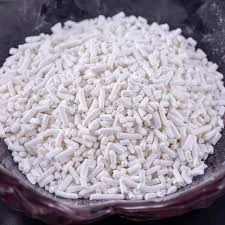
sulphate of potash fertilizer
The Importance of Sulphate of Potash Fertilizer in Modern Agriculture
In the realm of agriculture, the need for effective and sustainable fertilization methods has never been more pressing. As global food production must increase to meet the needs of a growing population, farmers are continually searching for fertilizers that not only boost yield but also improve soil health. One such fertilizer that has gained prominence in recent years is sulphate of potash (SoP), a potassium fertilizer that offers a myriad of benefits for various crops.
Understanding Sulphate of Potash
Sulphate of potash, chemically known as K2SO4, is a soluble potassium fertilizer that contains two essential nutrients potassium and sulfur. Unlike some other potassium sources, such as chloride of potash (Muriate of Potash), SoP is free from chlorides, making it suitable for chloride-sensitive crops. This attribute is particularly important for crops like tobacco, fruits, vegetables, and some root crops, which can suffer from chloride toxicity.
Potassium is crucial for plant growth, playing a vital role in several physiological processes including water regulation, enzyme activation, and photosynthesis. Sulfur, on the other hand, is essential for protein synthesis and is a key component of certain amino acids. The synergistic effect of these two nutrients in SoP enhances plant resilience to environmental stressors and improves overall crop quality.
Benefits of Sulphate of Potash Fertilizer
1. Improved Fruit Quality and Yield Research has demonstrated that the application of SoP can lead to enhanced fruit size, taste, and quality. This is particularly beneficial for fruit-bearing crops, where marketability is closely tied to these factors. Farmers applying SoP have reported higher yields and improved economic returns.
2. Chloride Sensitivity Many crops are sensitive to chloride, which can lead to decreased yields and poor quality. SoP provides a potassium source without the negative effects associated with chloride, making it the preferred choice for chloride-sensitive crops.
sulphate of potash fertilizer

3. Soil Health The application of sulphate of potash can improve soil health by enhancing microbial activity and promoting a balanced nutrient profile. An increase in sulfur availability can also improve nutrient uptake, which further contributes to soil fertility.
4. Stress Tolerance Potassium plays a critical role in plant physiological processes that enhance stress tolerance. SoP can help plants cope with drought conditions and enhance their resilience against diseases, contributing to better overall health during adverse environmental conditions.
5. Nutritional Value The application of SoP can increase the nutritional value of crops. The high potassium content helps in accumulating starches and sugars in plants, which is essential for crops like potatoes and sugar beets, leading to higher-quality produce.
Application and Best Practices
The effectiveness of sulphate of potash fertilizer largely depends on proper application practices. It is essential for farmers to conduct soil tests to determine potassium and sulfur levels in their fields. Based on these tests, farmers can make informed decisions about the application rates of SoP to maximize benefits.
Typically, SoP can be applied either as a broadcast application before planting or as a side-dress fertilizer during the growing season. It is soluble in water, which makes it an excellent choice for fertigation—applying fertilizers through irrigation systems. This method ensures that nutrients are delivered directly to the root zone, improving uptake efficiency.
Conclusion
As the agricultural landscape continues to evolve, sulphate of potash fertilizer stands out as a crucial tool for farmers looking to optimize crop production sustainably. With its dual nutrient profile and several agronomic benefits, SoP can enhance both the quality and yield of various crops while promoting healthier soils. As more farmers recognize the advantages of this fertilizer, its role in sustainable agriculture is poised to expand, contributing significantly to global food security in the face of growing challenges. Therefore, investing in sulphate of potash is not just a choice but a necessity for the future of farming.
-
Understanding Synthetic Rubber OptionsNewsApr.27,2025
-
Trichloroisocyanuric Acid: Essential for Clean and Safe WaterNewsApr.27,2025
-
Sodium Dichloroisocyanurate: Key to Safe Water TreatmentNewsApr.27,2025
-
Sodium Acid Pyrophosphate: Essential in Modern Food ProcessingNewsApr.27,2025
-
Essential Water Treatment ChemicalsNewsApr.27,2025
-
Denatured Alcohol and Its Industrial UsesNewsApr.27,2025
-
The Versatile Uses of Sodium BicarbonateNewsApr.24,2025
Hebei Tenger Chemical Technology Co., Ltd. focuses on the chemical industry and is committed to the export service of chemical raw materials.
-

view more DiethanolisopropanolamineIn the ever-growing field of chemical solutions, diethanolisopropanolamine (DEIPA) stands out as a versatile and important compound. Due to its unique chemical structure and properties, DEIPA is of interest to various industries including construction, personal care, and agriculture. -

view more TriisopropanolamineTriisopropanolamine (TIPA) alkanol amine substance, is a kind of alcohol amine compound with amino and alcohol hydroxyl, and because of its molecules contains both amino and hydroxyl. -

view more Tetramethyl Thiuram DisulfideTetramethyl thiuram disulfide, also known as TMTD, is a white to light-yellow powder with a distinct sulfur-like odor. It is soluble in organic solvents such as benzene, acetone, and ethyl acetate, making it highly versatile for use in different formulations. TMTD is known for its excellent vulcanization acceleration properties, which makes it a key ingredient in the production of rubber products. Additionally, it acts as an effective fungicide and bactericide, making it valuable in agricultural applications. Its high purity and stability ensure consistent performance, making it a preferred choice for manufacturers across various industries.











